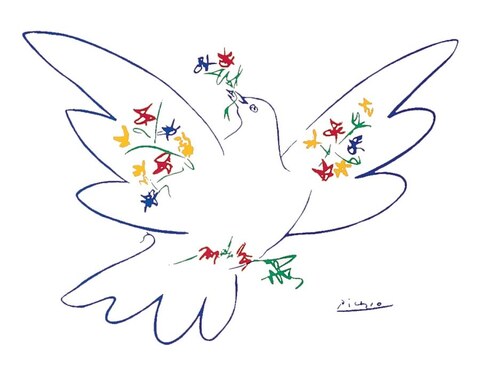
We'd taken a path not really knowing where it would lead, not knowing how long it was, and while still on our way, realizing we had taken the wrong road but that it was too late to turn back, every one of us, so as not to be swallowed up by the dark, had started slicing off pieces of our own flesh.
― Ismail Kadare, "Agamemnon's Daughter: A Novella & Stories"
#ceasefirenow #standbyinternationalhumanitarianlaw
I am blessed to be living with a historian. "I take the long view," my husband, Jim, tells me whenever I recite the upshot of a recent article that has spun me into despair. In other words, he insists, humankind has become more "civilized" and the wars we are witnessing and/or experiencing are not the barbaric bloodbaths of the 12th century. Is that what he means? No, what he is referring to is the progress we've made against disease, poverty, inequality, etc. I don't buy the argument that advances in science, technology and governance have made us more "civilized," or that there are fewer tyrants as heads of state. Take a breath, I say, look at the map of the world, all the wars and migration because of war, disease, poverty, intemperate government, repression of civil liberties, and climate change. Where, indeed, are we headed?
So that's my retort to "I take the long view," not optimistic, I know, but there it is. I appreciate Jim's optimism; it's one reason among many that I married him. He says I'm a pessimist. Not exactly, more a realist, I'd say. I applaud all progress, I stay connected, I keep my eye on good things that are happening among and between people in my neighborhood, and the larger world, and report on them. But Jim's family secured their safety in America after the pogroms at the turn of the 20th century. One of the first Jewish families who settled in Seattle, the Bergmans owned salmon fisheries in Alaska, and also a luggage store in town, "Bergman Luggage." The store and the sign are still there, though owned by another family. His family has long roots in America by now, whereas mine are just one generation away from war, displacement and atrocity. It makes a difference; my perspective is short, from here to there is not far. Once again the eruption of vengeance and unimaginable violence disturbs my sleep. Though far away in miles, perhaps, and safe or safe enough in America, I feel the conflagrations in my bones. It's also because I know people there. I have an acquaintance in Ukraine, a broadcaster, and Israeli and Palestinian relatives and friends. I stay in touch with all of them as best I can from my safe enclave.
Fanatics in the Middle East—Muslim, Jew—who read and obey the scriptures written millennia ago—revere a God who sanctions rape, slavery, and the execution of nonconformists and infidels. This, the present-day warring tribes have in common, and much else, including a rapacious insistence on a God-given homeland. How can we who live in relative privilege and enlightenment, safe from the day to day siege, quiet these ignorant voices and murderous actions? How will our polarized, enraged conversations on social media and zoom calls and college campuses help? Is it not time to walk in concert with one another towards peace as Martin Luther King Jr. and Gandhi once did for the benefit of us all? Have we forgotten their courageous example?
The words injustice, genocide, equality, reparations, and Geneva Conventions do not appear in ancient parchments or on the lips of dictators. Nonetheless, they are enshrined in international humanitarian law. Though tender in its application as contemporary wars effloresce, this law deserves attention and celebration every day. It saved what is left of my family. One day, it may save yours.
This post is dedicated to my physician parents who fled to Paris and worked for the Red Cross there until boarding a British convoy to New York. They risked their lives to escape a genocidal war zone, became front line workers, and helped many refugees heal, physically and psychologically, once they landed in America. #ceasefirenow #standbyinternationalhumanitarianlaw








